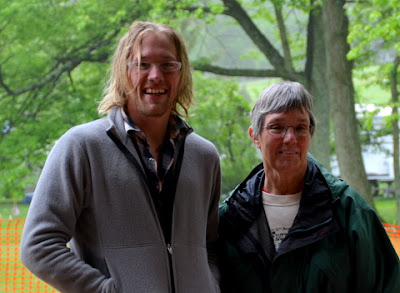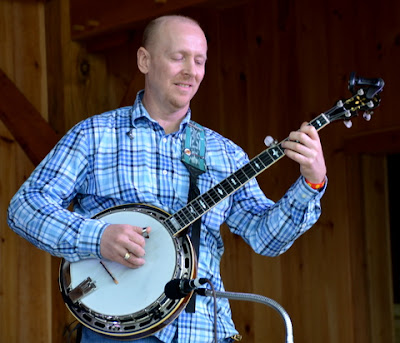Strawberry Park Bluegrass Festival combines one of the best natural amphitheaters found anywhere with sound by Cobra Sound to produce some of the most watchable and listenable bluegrass available. Combine that with a family friendly environment and you have a setting for a fine weekend of bluegrass that has survived much to continue into its thirty-sixth year. Thursday was warm and a little muggy, providing a comfortable climate well into the evening attended by an excellent, knowledgeable opening evening audience who recognized excellence and recognized it with applause and standing calls for "More!"
The Usual Suspects Begin to Assemble
in the Jamming Area
Dale Ann Bradley
The great Dale Ann Bradley opened and closed Thursday's show. Five time and reigning IBMA Female Vocalist of the Year, Dale Ann continues to have one of the clearest and most vibrant voices in bluegrass while a new confidence seems to be present in her performances. The addition of lifelong friend and frequent singing partner Steve Gulley on bass, singing harmony, and contributing his own solos has relieved Dale Ann of some of the pressures of having the whole show on her shoulders, freeing her to sing even better. It was also a real pleasure to hear Dale Ann in a solo performance on the Americana/workshop stage sing some of her favorite songs as well as requests. Accompanying herself, seated and interacting informally with a too small audience, she was simply superb. Dale Ann Bradley is a true treasure to bluegrass music.
Dale Ann Bradley
Steve Gulley
Vic Graves
Greg Hodge
Jason Burleson
Dale Ann
The Workshop Stage
Hot Mustard
Hot Mustard is a somewhat unusual band in that it features two - count them...two, banjos. With Bruce Stockwell, a virtually unknown, except among the top banjo players in the country, banjo master and his former student Bill Jubett on banjo, it works. April Hobart Jubett, fresh back from childbirth, is a fine traditional singer, and Bruce's wife Kelly has become an excellent bass player. The band is well-liked regionally, and deserves further attention.
Bruce Stockwell
Kelly Stockwell
Bill & April Jubett
Baby Jane Jubett & Grandmother
at her First Festival
Dave "Tex" and Robin Orlamoski
The Honeydew Drops
This engaging folk duo, Laura Wortman and Kagey Parrish, presented a low keyed, pleasant set, and will be seen on the Americana/Folk Stage on Friday. Based in southwestern Virginia, they combine a mountain sensibility with a contemporary feel.
Laura Wortman
Kagey Parish
Kathy and James
Grasstowne
Grasstowne, when it was formed, seemed like a great idea. Three well-known bluegrass pickers with impeccable musical pedigrees coming together to create their own unique sound. As so often happens, the reality, despite artistic recognition, didn't quite jell. Of the three, Alan Bibey has stayed with the sound and vibe of Grasstowne, while changing personnel and looking for that elusive something that helps it to take off. With its current configuration and interesting interpersonal interactions, Grasstowne is poised to accomplish it's goal, if they can be heard and seen enough to make it happen. Alan Bibey, long recognized as one of the premier stylists among mandolin players, remains at the top of his game. His new CD with friend Wayne Benson serves to confirm this, and a new Grasstowne CD is being released in the next few weeks.New singer Blake Johnson has a remarkable bluesy voice. Veterans Adam Haynes and Justin Jenkins are both fine pickers and harmony singers. Kameron Keller on bass is steady as a rock. If you haven't paid attention to Grasstowne recently, now's the time.
Alan Bibey
Blake Johnson
Adam Haynes
Kameron Keller
Alan Bibey
Strawberry Park Bluegrass Festival appears to be successfully coping with changes in ownership and leadership. The Park is being spruced up and the lineup is as strong as ever, with a blend on varied national bands, local favorites, and new entries. It's going to be hot here in more ways than weather for the next three days.
























































































